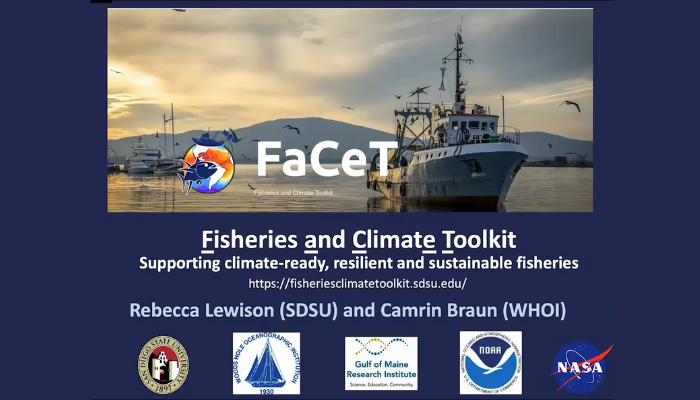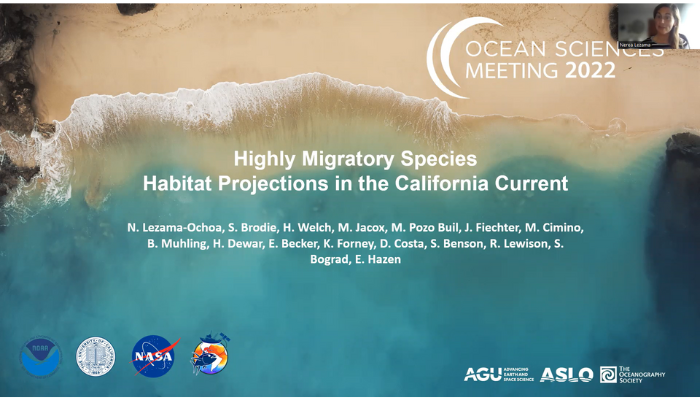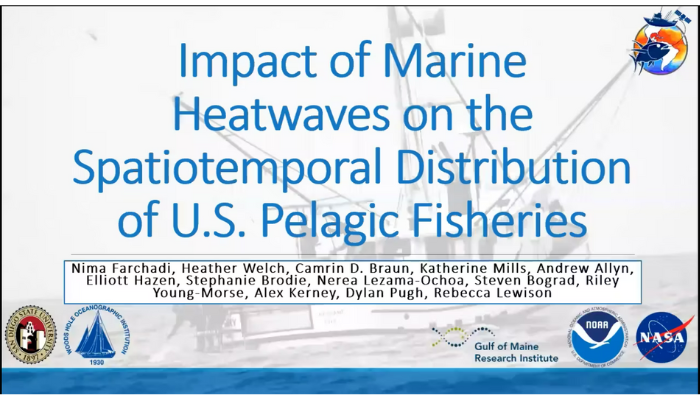FaCeT
Highlights
The FaCeT team frequently attends and presents at meetings with stakeholders and partners to learn, engage, and share opportunities, challenges, and effective proactive practices for climate-resilient fisheries. We also regularly collaborate with and contribute to the science and fishery communities through our research and associated publications.
We invite you to read our team's publications and watch some of our event highlights.
Publications, Presentations, and Workshops
2024
Seattle, Washingtion
FaCeT team member Nima Farchadi participated in a collaborative workshop that brought together experts from academia, management, government institutions, and non-governmental organizations across the country studying the impact of climate-driven range shifts of fish stocks in US waters. For further details about this workshop and its findings, see the publication in Marine Policy (December 2024).
Halifax, Nova Scotia, Canada
Sharks, globally threatened by overfishing and climate change, represent key marine apex predators that support healthy ocean ecosystems. FaCeT team members Nima Farchadi and Laura McDonnell are excited to have participated in a collaborative workshop hosted by Dalhousie University focused on developing novel dynamic applications of species distribution modeling for endangered shark conservation and management.
Helsinki, Finland
Congratulations to FaCeT team member Nima Farchadi for his Ecological Forecasting Initiative (EFI) Futures Outstanding Student Presentation Award! The award is given to promote and reward outstanding student presenters and recognize their commitment to excellent research presentation skills. Read about Nima's recognition at the 2024 EFI Conference.
See Nima's award-winning presentation poster.
A study published in Fish and Fisheries (April 2024) and led by Nima Farchadi explores how a decade of marine heatwaves redistributes pelagic fishing fleets on both the US East Coast and West Coast. The study reveals that marine heatwave size (i.e., the spatial extent) can be a significant influence on redistributing fleets compared to the intensity or duration of such extreme temperature events.
Learn more about Tracking Vessel Responses.
2023
Publication
A paper in Diversity and Distributions (December 2023) led by Nerea Lezama-Ochoa reveals divergent responses to climate change predicted among 10 highly migratory species in the California Current System (CCS) by 2100.
Learn more about FaCeT's CCS Futures.
Woods Hole, Massachusetts
The FaCeT team led a workshop that brought together transdisciplinary leaders in the field of climate vulnerability assessments (CVAs) and dynamic species distributions models. We identified limitations in the current CVA process and discussed how to leverage methodology advancements to develop the next generation of CVAs that are reproducible and adaptable over time.
Virtual
In August 2022, the Environmental Defense Fund held a collaborative virtual workshop that included FaCeT team members among thirty-five stakeholders from diverse fishery-related sectors. The best practices and key takeaways distilled from that workshop have been published in Marine Policy (September 2023), in a paper co-authored by Rebecca Lewison.
Publication
A study published in Science Advances (August 2023) and led by Camrin Braun finds that economically and ecologically important marine predators in the Northwest Atlantic (NWA) are predicted to lose up to 70% of their current habitat due to ocean warming.
Learn more about FaCeT's NWA Futures.
Publication
A paper from FaCeT, led by Camrin Braun, focuses on the effects of different types of species data on model performance and predictive ability. With the expansion of diverse data sources, our findings provide critical guidance to practitioners in advancing species distribution model development, thus enhancing both model robustness and ecological applicability. Check out the article in Ecological Applications (June 2023).
2022
Virtual
Virtual
During summer 2022, FaCeT attended an Environmental Defense Fund workshop that brought together experts across US regional fishery management councils, the National Marine Fisheries Service, academia, and the private sector. Participants identified the lack of entry points for climate knowledge to inform the management process as a bottleneck hindering climate resilience in fisheries. FaCeT co-PI Rebecca Lewison demonstrated how FaCeT tools can be utilized to facilitate climate resilience in fisheries.
Spokane, Washington
Virtual
FaCeT presented the team's novel research efforts to help develop climate-ready and sustainble fisheries at the Ocean Science Meeting (OSM) in 2022. The OSM is a global convention of scientists and the broader conservation-focused ocean community. The biannual convention is co-sponsored by the American Geophysical Union, the Association for the Sciences of Limnology and Oceanography, and The Oceanography Society.
2021
Virtual
Virtual
2019-2020
Virtual (2020)
San Diego, California (2020)
At Ocean Science Meeting 2020, the FaCeT team organized a town hall meeting to discuss how dynamic ocean management can support climate-resilient fisheries. This event brought together fishery stakeholders across various organizations and agencies to explore the potential for dynamic ocean management as a tool to understand, promote, and plan for climate resilience in current and future fisheries management.
Reno, Nevada (2019)






